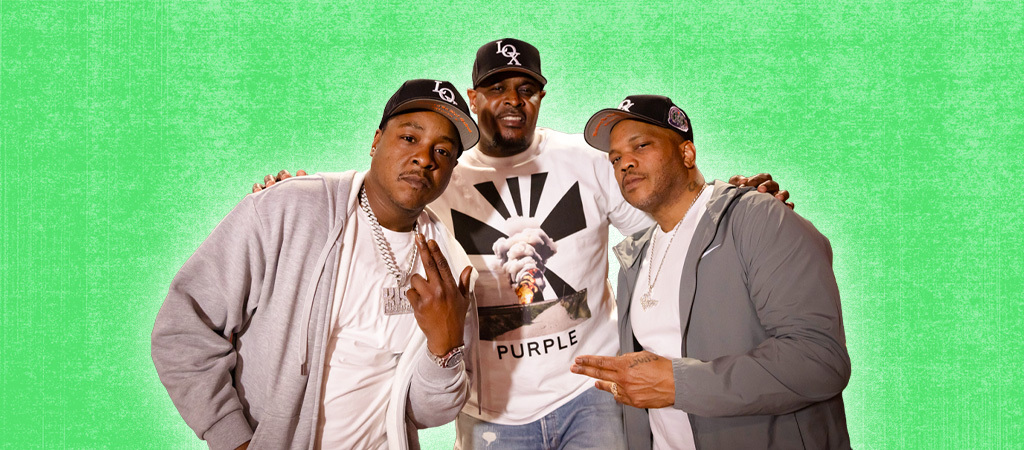
The Lox are the perfect act for a starring role in Red Bull’s ongoing Spiral Freestyle series. The trio is still going strong after 30 years — arguably, stronger than ever, as both independent artists and entrepreneurs — and are one of the few rap acts of their generation to be regularly invited on (and dominate) internet-favorite platforms such as Spiral, NPR Music Tiny Desk Concert, and Verzuz. The latter could be called the origin point of their resurgence over the past few years, as it gave fans a front-row seat to experiencing the three rappers’ dynamic friendship, the core of their continued camaraderie.
While at Red Bull Spiral Studios to shoot the freestyle, Jadakiss, Sheek Louch, and Styles P took some time out to chat with Uproxx about their impressive longevity in the rap business, the brotherhood that has kept the group together all this time, and which of the products from Styles’ health-focused Juice For Life bar would pair best with the titular energy drink.
What made you guys want to do the show? Like, somebody reached out to you and you were like, “This is a dope concept”? How did that whole process get started?
Sheek: Our manager, Mike Brink, had reached out saying you guys are interested in doing it. And everybody’s been hitting us to do freestyles, and we’ve been passing on everything. We just thought the Red Bull experience would be the dopest thing. The dopest sh*t, you heard?
Jadakiss: Also, we have a new project coming out, so it fits. It goes with the rollout.
What can you guys tell me about the new project?
Sheek: It’s dope.
Jadakiss: It’s fire.
Sheek: The content is incredible as far as our wordplay showing that we’re grown what we talk about, but not grandpa-ing it out.
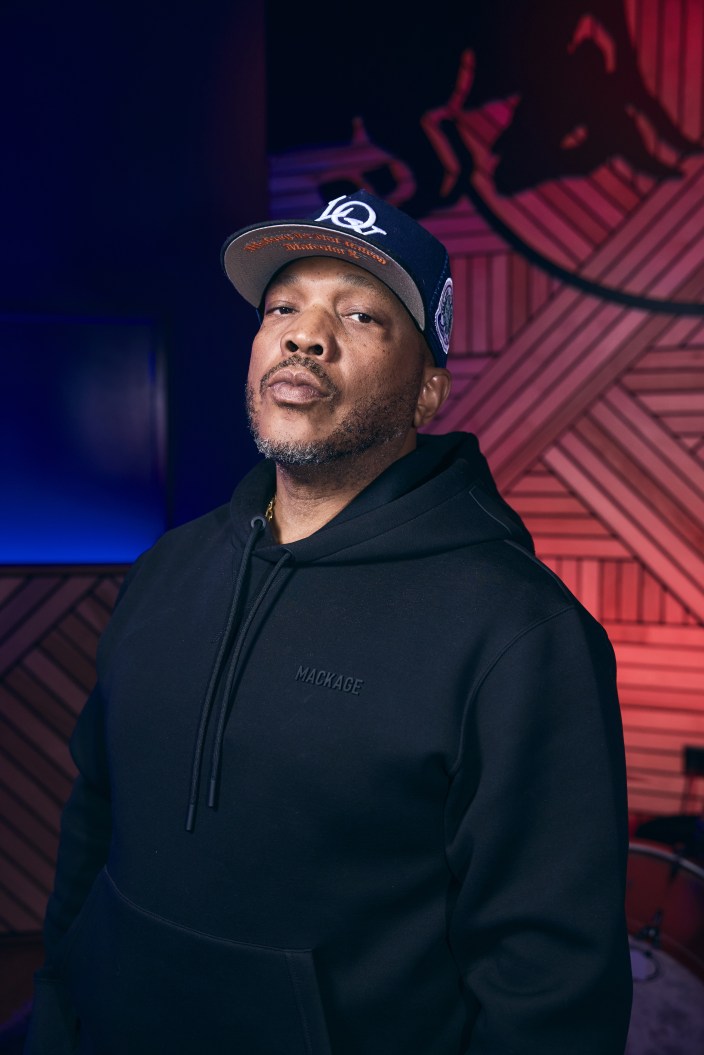
You guys have been recording and releasing music as a group for over 30 years now, and a lot of your peers either age out or they get into “grumpy old man” mode, and they don’t really stay relevant. But you guys stay relevant. You’re doing Spiral, you have the podcast, you guys did Verzus, and you guys showed that you were able to really connect with an audience that didn’t necessarily even up on your music the way I did. What’s been the secret sauce that kept you guys relevant?
Styles: I think it’s the fact that we are true emcees and true fans of what we do and true fans of hip-hop, so we respect our peers. We definitely respect those who came before us and we respect those who are coming behind us. So, I think our love and our craftsmanship gets us that extra nod.
Sheek: And we listened, too. We hear what’s going on out there.
Jadakiss: We embrace what’s going on. We ain’t put ourselves in a bubble. We have kids, we have sons and daughters and beautiful kids that also help us. They blasting out of their room what’s going on. They putting us on to what’s out there, what’s up and coming. Mixed with our knowledge and not getting in grumpy, grandpa old-man mode, that helps us create and helps us grow. Of course, we stay in our lane to stick to what we do, but just to know what’s going on is always helpful.
Speaking of what you guys do, obviously you guys are kind of that wave of very punchline-heavy, wordplay-heavy, lyrically focused artists. People my age, people your age, don’t really appreciate a lot of what the kids are doing. A lot of what the younger artists… yelling and screaming and rage music. Why is it so important, with where the kids are, for you guys to keep doing what you do?
Sheek: Guys like y’all, it’s a nation that needs us to keep going.
Styles: It’s a bunch, man.
Jadakiss: And it is what we learned. It is what we came up on. There’s always ways to evolve. You should never switch. You can’t switch the foundation. If you buy a house that’s a fixer-upper, you’re going to leave the same foundation and just change the roofing, then change the siding and change some things, but the foundation will remain and that’s how we feel about hip-hop. We love it, and we embrace it and this and that, but we stick to what we know. We just switching the seasoning in the cabinet a little bit.
Sheek: We understand that assignment, man. Hundred percent. You know what we going for.
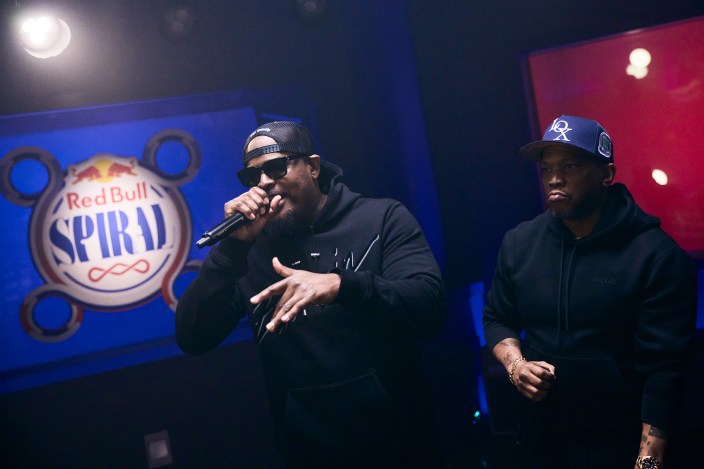
Jada, do you have a favorite Sheek Louch line? Do you have a favorite Styles P line? Styles: Do you have a favorite Sheek line? Do you have a favorite Jada line?
Styles: I can answer you: no.
Jadakiss: I do not have a favorite line. I mean, we really like family, we just happen to be a group. We don’t sit around and listen to each other’s songs like that. We help each other. We compliment each other, and we salute each other and use each other as crutches.
Sheek: Exactly what he said. “You murdered that verse, man. We got off. But you murdered that verse.” We say some shit like that to each other.
Styles: We here for the cause of the group. There’s always going to be inside friendly competition. That’s what makes the songs good, but at the same time, you trying to make some capital and gain some equity and do some shit big around here.
What’s the best part about being in a group that has been around for so long? What are some of the benefits to your careers that being able to say “The LOX” as a name still means something after 30 years of having done this together?
Styles: I mean, for me to come in and be able to share a lifestyle with your brothers that you imagined and dreamed of making it together, and then making it together and then conquering land and taking over the world together. You have a story that you could look back on and laugh and enjoy times and say who you enjoyed it with. That’s the whole purpose of this hip-hop shit.
Sheek: I actually love the fan reaction when we do shows. It’s packed, and it’s sold out, it shows that, like, “Man, you guys still love us.” That’s when you know. They sing it word for word, and we keep doing bigger things, and even when we switch it up, let’s say like a Tiny Desk, and you on a show with a live band and all that, and they still love it, and they still want certain things from us.
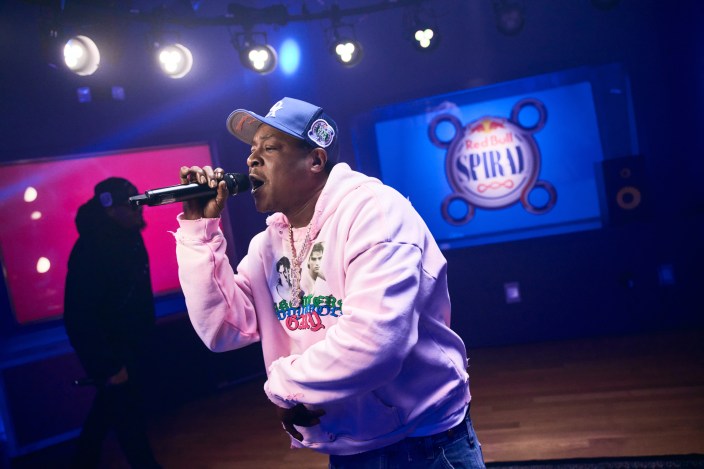
Since you guys are at Red Bull, you’re doing the Red Bull Spiral and you guys are big into juicing, smoothies and all that, what kind of juice or smoothie really pairs best with a Red Bull?
Jadakiss: A bark!
Styles: Nah, with a Red Bull, if I was going to drink something with a Red Bull, I’d make it like a lemon grapefruit ginger mixed with the Red Bull.
Sheek: That’s kind of what I was thinking. Can’t be an Armageddon. Grapefruit, ginger ale… can’t be no peanut butter.
Jadakiss: You heard that? Lemon, grapefruit, ginger, Red Bull. No peanut butter, no bananas, none of that.
Thank you so much for sharing your time with me. If you guys have anything else you want to talk about, now is the time.
Sheek: New album coming soon!
Jadakiss: New LOX hats online.
Styles: Make sure you cop Kiss Café, make sure you cop Farmacy For Life. Make sure you cop Juices For Life. Make sure y’all take care of yourselves, and we love y’all.
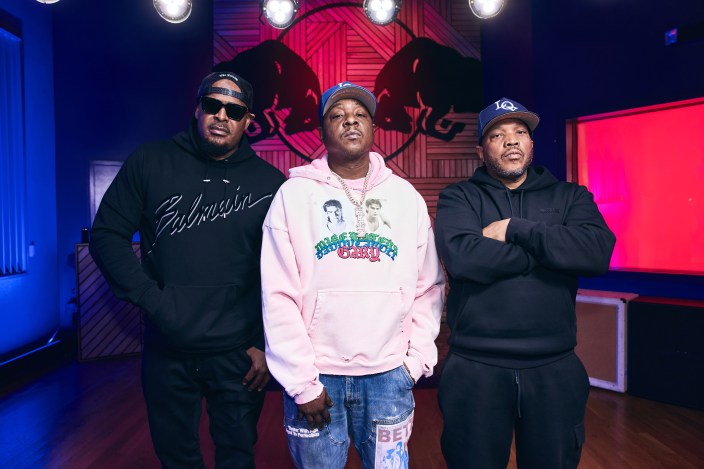
You can check out the Red Bull Spiral freestyle above.
source https://uproxx.com/music/the-lox-interview-red-bull-spiral-freestyle/
Comments
Post a Comment